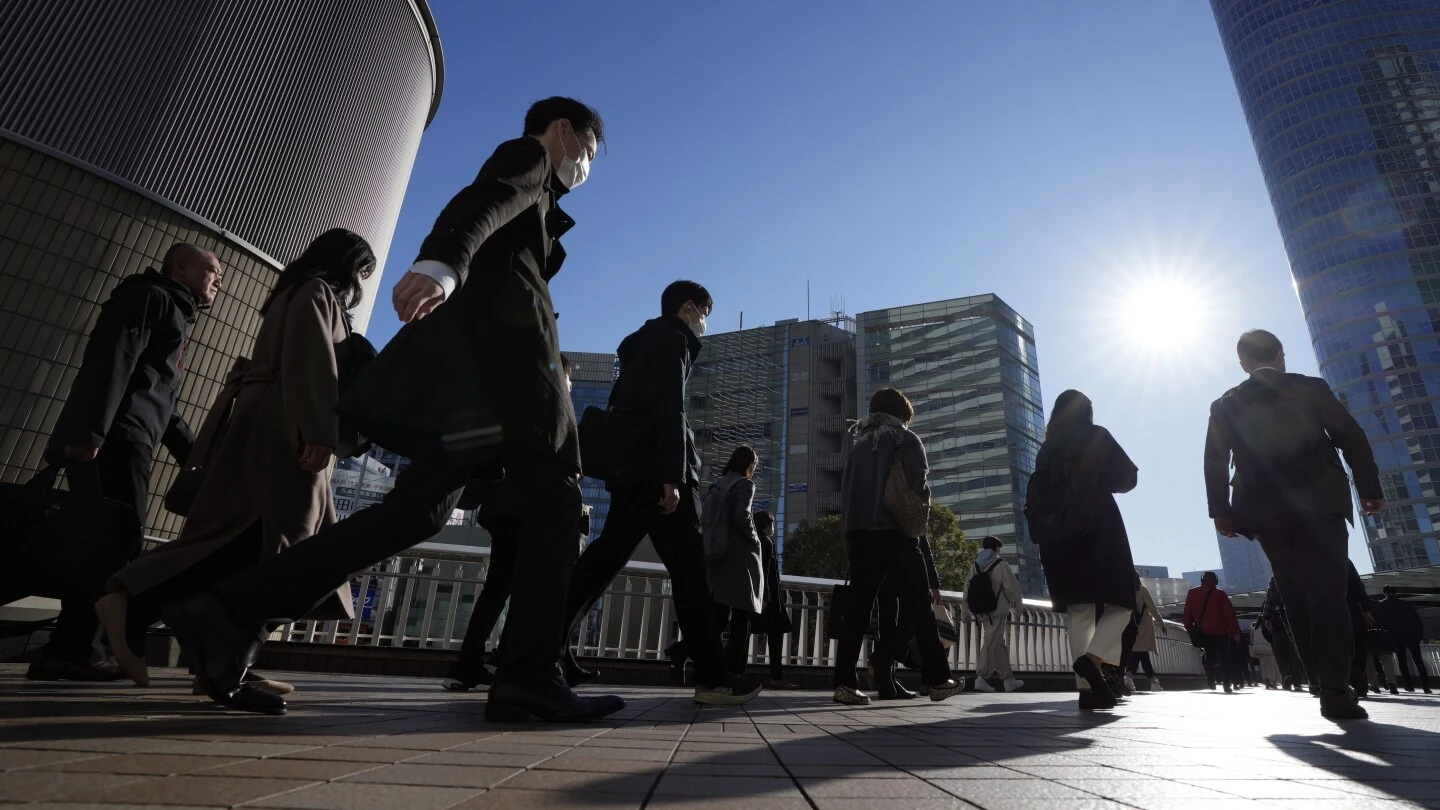- cross-posted to:
- worldnews@lemmit.online
- cross-posted to:
- worldnews@lemmit.online
Japan, a nation so hardworking its language has a term for literally working oneself to death, is trying to address a worrisome labor shortage by coaxing more people and companies to adopt four-day workweeks.
The Japanese government first expressed support for a shorter working week in 2021, after lawmakers endorsed the idea. The concept has been slow to catch on, however; about 8% of companies in Japan allow employees to take three or more days off per week, while 7% give their workers the legally mandated one day off, according to the Ministry of Health, Labor and Welfare.
Hoping to produce more takers, especially among small and medium-sized businesses, the government launched a “work style reform” campaign that promotes shorter hours and other flexible arrangements along with overtime limits and paid annual leave. The labor ministry recently started offering free consulting, grants and a growing library of success stories as further motivation.
“By realizing a society in which workers can choose from a variety of working styles based on their circumstances, we aim to create a virtuous cycle of growth and distribution and enable each and every worker to have a better outlook for the future,” states a ministry website about the “hatarakikata kaikaku” campaign, which translates to “innovating how we work.”
It always surprised me that the country that pioneered Lean production techniques has always had such an enormous waste of labour resources in their office culture.
They have one of the lowest GDP per hour worked of all Industrial nations.
Italy, Spain and Germany have way higher labour productivity, while even Turkey edges out Japan.
Also, it’s established practice for workers to stagger their off days across the week.
This way both the company and things like services, banks, stores etc. can be available 7 days a week without any undue pressure.
So they’re already well positioned to take advantage of flexible working time.
Was listening to an interview with NY Governor on imposing cell phone ban in schools. Said if they left it to individual schools or school districts, there would be lots of pressure from parents or individual groups not to do it and the whole thing would fail. And if they made it voluntary, some kids would comply, but there would be social pressure to keep things as-is, due to FOMO.
Instead, the government would pass a uniform, mandatory law and take the heat.
Seems like that’s what will be needed to change everyone to a 4x8 week. Similar dynamic. Do, not ask.
That sounds like classic Game Theory. Nobody’s going to do it because it a few don’t they have an advantage, except when it’s forced from above changing the playing field.
People in the UK were strongly against universal healthcare until it was forced on them. Now I dare someone to campaign on abolishing the NHS.
4-day week seems overwhelmingly positive for all parties. Why is it so slow to catch on?
Dunno if it has improved, but Japanese work ethic is an entire beast by itself. It’s so hierarchal and culture based that lots of business management classes even use it as a prime example of how different the system can be depending on where you are.
Someone I knew worked as an engineer at a US company, and they had also brought in some engineers from Japan.
He was expected to work 9-5 yet he said no matter how early he came in, there were always several Japanese workers there, and they would stay as late as 11 pm.
All this despite it being a US company, which doesn’t expect it’s workers to go insane on overtime.
Point being is that it is so ingrained into their society, it is difficult to change, even if there are immediate benefits from a new system.
Point being is that it is so ingrained into their society
Kinda. Doing that would actually run them into legal problems in recent days due to cracking down on working conditions. If an employee works without clocking in, they could even be found in violation of law (which is how people used to get around that; social pressure would mean clocking in late and clocking out early yet still working). There is still a social pressure issue to fix, but I think the younger generation has had enough of it on this front; wages are stagnant, inflation is rising, the lifetime employment system is eroding, bonuses are low or gone, etc.
I’m going to guess it’s the same origin as “the cruelty is the point”. Some people just don’t want other people to be happy.
Also some people aren’t fact driven. Working fewer days feels like it should be less productive, so it must be.
If I had to guess, it’s probably because the entities in charge of these changes are very old and very stuck in their ways.
So-called risks taking executives/business people when they could take a risk to benefit their employees without hurting their bottom line (and possibly even increasing it):
That’ll be us when we’re old, in-charge and stuck in our 2020 ways
Work only lose 20% of my time, but I gain 50% free time.
I punch those numbers into my calculator, it makes a happy face.
It’s not about what is better for both parties, it’s about control. Leadership and the 1% want to keep us in line. If they relent and give us a better work/life balance, what’s next? Raises that match inflation? Better benefits?
Because you’ll never convince the right people that these people would produce same results as they do in 5 days.
I’m sick of hearing of excuses made by the folt who haven’t lifted a finger in decades.
What are managers going to do the fifth day, stay with their family ?!!
Managers have time bombed agendas and think everyone else have too.
Because, of control, power, and because many of the older generation seem the think that if they had to suffer in some specific way, then it’s their duty to pass that same suffering on to the next generation.
But will they feel safe to use it? I feel like they tried this with time off, but workers felt like they couldn’t use it without repercussions to their career and work social life.
It’s like those jobs with “unlimited” PTO in the US. Yeah go ahead and use it all you want then see if you ever get a raise or even how long you last. I’m sure some companies do it right but I think it’s a trap.
Most jobs like that, or really any pay scheme other than piece work or an hourly wage usually has the process of:
- You can take as much PTO as you like.
- You can take as much PTO as you like…provided you get all your work done.
- You work like a dog, get all your work done, and take time off.
- Since you were able to get everything done and have time left over to not work, your boss increases your workload, so now you have to work like a dog, all the time, or else you’ll never get everything done.
It’s like playing chess, and while the other player can’t change the rules as they go, but a condition for playing with them is that they get two moves every turn.
Don’t forget that with “unlimited PTO” you have nothing to cash out in the states that allow you to do that when you leave.
The entire scam of unlimited PTO is that the company doesn’t have to pay out any unused time when you leave.
It certainly doesn’t increase the time off you get while still at the company. Studies show people take less time when it’s unlimited.
legally mandated one day off
As a french : what the fuck, Japan ?
The question is, which worker in an office will be the first to come in only four days a week.? They have to make management shut down the office, otherwise the workers will be too afraid of management to not be seen.
Having lived and worked for many years in both Europe and the US, the US has the absolute worst work-life balance and labor regulations I’ve ever experienced in my life. Japan makes the US look like a kindergarten.
The article literally says that the Japanese have a word for people who work so hard they die.
a nation so hardworking…
Or hardly working given how backwards and out of date the work culture is, but sure let’s make this out to be the fault of employees who are likely overworking due to low pay. An extra day off isn’t going to fix the systemic cultural issues, class discrimination, xenophobia… the list could go on and on.
Calling this innovative when Japan has yet to modernize its business practices, or admitting it’s an issue, is disingenuous at best.
Well, that would be one way to encourage young folks to have more babies and turn around Japans low birth rate. More time to actually spend in relationships with someone other than your coworkers would be a good step in the right direction.
A real struggle is couples finding daycare, especially when a lot of them are crammed into the same area chasing jobs. Remote and other things would also do a lot to help this.
Just had read this: Workers in Japan can’t quit their jobs. They hire resignation experts to help
Despite laws, mind you.Woah, how are there not the bloody remains of the bosses strung across the streets? That would happen to me once, then I would be in literal prison. Seems like a nicer place than THAT anyway.
Yeah but is that 4 16 hour days?
Let’s do three 26 hr days. My excel sheet says this will increase profits super hard.
What else does your excel sheet say will become super hard?
.XXXLS
It tries to make dates out of everything so you know what.
Sometimes cultures have really toxic ideas on them. Probably all cultures have something. Like in the US there’s a lot of “the only emotion men are allowed is anger”, for example.
How do you fix that? Is there a general solution? Because sometimes it’s like enforced by the very people it’s harming.
But it’s all social. Made up. It’s not like physics. We can’t all decide that acceleration due to gravity on earth is now a nice round 10 m/s². But we could just decide working long hours is bullshit.
This might be philosophical, but I think a lot of people make a mistake, when they assume that just because something is made up, it somehow makes that thing less real, and less of an obstacle to overcome. The quality of being made up says something about a thing’s origin, not about its level of realness.
As stated, that notion might be philosophical, but following it’s own rules, that doesn’t impact the degree to which it, as with any other idea, exists as a thing that has the quality of realness (distinct from truth value) to it.
It definitely changes the options available to overcoming it!
A small club has a bylaw saying they serve no hard alcohol at parties. That’s a real rule that is enforced. But they can change it with an agreement, or just ignore it from time to time.
Something like acceleration due to gravity is going to happen no matter what.
Social emotional learning in schools would help.
I hope salary man gets the break he deserves.
At 16 hours a day? Heh
Better than 5x at 16h I guess. 😅
So they want to reduce the week from 7 to 4 days a week? ;-D
That’s (every day of every week) actually illegal in most circumstances with labor law. There’s a bit of nuance and edge cases, but this would be super illegal for the average employee to have to do and the government has been getting more strict about it.












